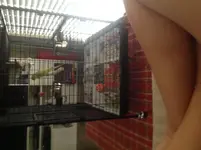Welcome to the forum. I, myself am considering reintroducing myself as I have not posted for quite some time, although I have visited frequently.
Anyway congratulations of your new baby, Russel. Since the average age for an Alexandrine to fledge is about 7 wks., he is still a baby and add to that the stress of moving to a new home environment and new humans, he is very much scared as he perceives this as a life threatening situation just as it would be in the wild. This has also probably caused him to regress somewhat, so he is very likely to be in need of being given some weaning formula at least 2 or possibly 3 times a day in addition to fresh raw fruits, vegetables and a limited amount of seeds. That would be best and then gradually allow him to wean himself off of the weaning formula. You are at that window of time when it is still the best and easiest time to teach him to eat a good healthy diet as this is the time that, in the wild that his parents would begin teaching him about what foods to eat as well as where to find them, so it is also a great time to begin to introduce him to foraging toys and how to use them. The best time to teach him to eat new foods is right after he first wakes up or at least start in the first half hour or so and before he is given anything else to eat. I would begin with a fresh raw fruit, followed by a fresh raw leafy green and then a fresh raw vegetable. I would suggest using pretty much the same method that his natural parents would have used, which is they take their newly fledged babies out with them to find food and place them on a branch while they go and get some food which they bring back to the branch and begin to eat it in front of their babies without offering them any, they then go and bring back more food and repeat this same process. They ignore their babies when they start to ask and beg for this food, but they do make it very easy for their babies to steal a piece of the food. This is how their parents teach them what to eat and so I figure that it is probably the best way for us as surrogate parents to teach our new babies to eat a variety of new foods.
I would proceed slowly with the new bird and spend a large amount of time familiarizing him to my presence and talking and singing to him while piddling around and just watching him through glances so that I could work myself closer to his cage when he is relaxed and going back to piddling when he gets nervous. And then when I was at the cage, still talking and singing and praising him for being such a good bird, I would start offering him a little bit of sprig type millet through the bars. I would place the millet through the bare at a perch, holding it with my fingers, while talking and praising him and wait for him to come to get the millet. If he does not come and get the millet in a few minutes I would put it in his food dish and come back in an hour or so and try this again. When he is taking the millet from my hand through the cage bars in a calm and relaxed manner and is approaching the spot in the cage that I normally offer him the millet before I get to the cage of if he comes towards the side of the cage that I am approaching from them it is time to open the cage and repeat the entire process at the entrance of the cage, being careful to not reach inside the cag during this process. When he is accepting the millet from my fingers at the entrance of the cage it is time to hold the millet either in the same hand or in the other hand in such a manner that he must stretch to reach the millet or place at least one foot on your hand to get a bite of the millet. At first if he even tries to reach for the millet move it so that he can get a bite and then back to where he must stretch to reach it. It should not be necessary to move the millet further back from him as if you are patient he will in a relatively short period of time be fully stepping up for the millet on his own.
This is the way that I do it at home as it is my primary goal to gain the trust of the bird and this can only be done by waiting on the bird to voluntarily cooperate with what I am doing. without this trust the bird will not properly bond or be willing to do much with you other than to develop the habit of avoiding you and then in biting to make you leave it alone. Without this trust with a bird you really have nothing, or so I feel.
I hope this is helpful to you and Russel.
 . Any tips to training or settling in would be greatly appreciated! What others have thought about them?
. Any tips to training or settling in would be greatly appreciated! What others have thought about them?


 :red:
:red: